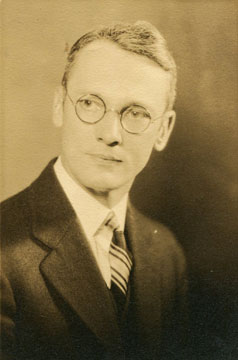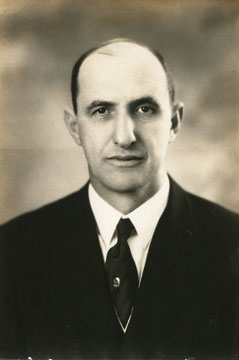The Presidents who faced the Great Depression
PC’s Tenth President: Burney L. Parkinson (1927-1928)
 Dr. Burney L. Parkinson, a native of Lincoln County, Tennessee, had a Ph.D. from Peabody College. Prior to his arrival at PC, he was the director of extension at the University of South Carolina. His one-year tenure was marked by personal frustration and a substantial increase in the College’s debt.
Dr. Burney L. Parkinson, a native of Lincoln County, Tennessee, had a Ph.D. from Peabody College. Prior to his arrival at PC, he was the director of extension at the University of South Carolina. His one-year tenure was marked by personal frustration and a substantial increase in the College’s debt.
After serving as President for just nine months, President Parkinson’s resignation was announced by the trustee chairman at the Commencement exercises of 1928. Parkinson felt the president’s duties were far too extensive and announced his nomination of Professor Marshall Brown as the man to become the first dean of instruction at Presbyterian College.
Parkinson left PC for a state job in Alabama and eventually served for many years as head of the Mississippi State College for Women. He retired from there in 1952 and died on Dec. 7, 1972.
PC’s 11th President leads college through the Great Depression
John McSween (1928-1935)
Reverend John McSween’s arrival at PC in 1928 was just one year before the financial crash which would begin the Great Depression. Although the College was carrying a debt of $350,000, it had excellent facilities and a top-quality academic reputation, so there was much optimism about the future. McSween’s presidency would largely be taken up with economic issues.
 During Rev. McSween’s first year, the Synod of Georgia joined the SC Synod in control and support of the College. The new charter required a name change from the Presbyterian College of South Carolina to simply Presbyterian College.
During Rev. McSween’s first year, the Synod of Georgia joined the SC Synod in control and support of the College. The new charter required a name change from the Presbyterian College of South Carolina to simply Presbyterian College.
This change resulted in a spike in enrollment of students from Georgia. Despite the withdrawal of many students due to financial difficulty, the student body increased by approximately 30 percent during McSween’s tenure. In the fall of 1931, PC once again opened its doors to women and approximately 26 women enrolled at PC during the fall of 1931, according to Ben Hay Hammet in The Spirit of PC.
It was during McSween’s presidency that the college received a significant gift from John Young, a major landowner in the area. Mr. Young’s gift was a beautiful colonial-style home (1916) located across Broad Street from the West Plaza which would become the president’s home.
Rev. McSween brought the college through the Depression, strengthened its ties with the church, and further improved its academic reputation. He resigned his presidency at PC in 1935 to become the pastor of the Purity Presbyterian Church in Chester. Rev. McSween died in Clinton on May 3, 1964.
Source: Information provided by PC Archives
